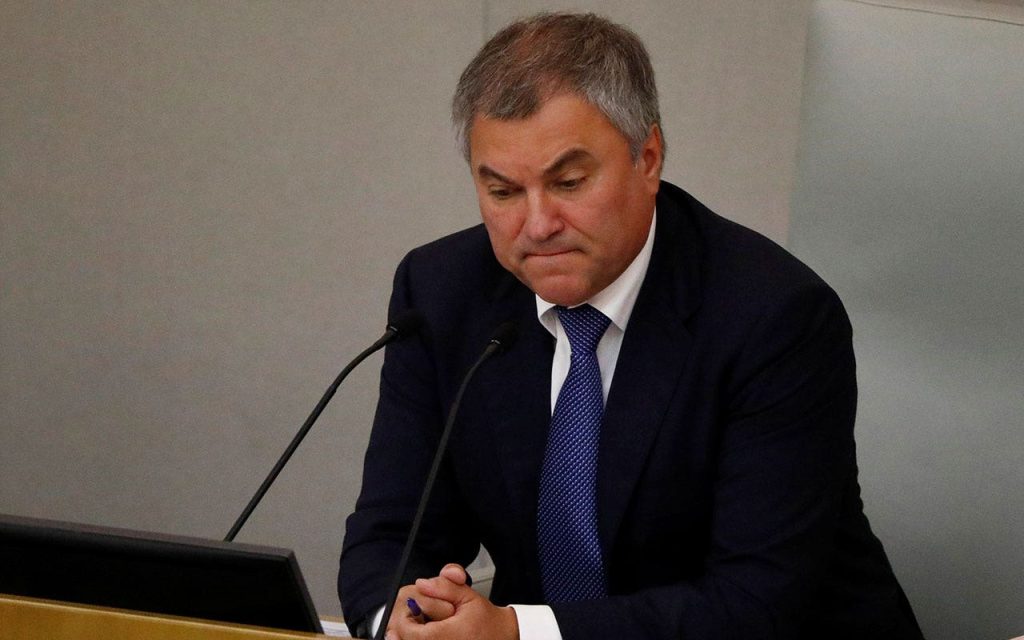The U.S. House of Representatives recently passed legislation that would allow the potential transfer of seized Russian assets to Ukraine. In response, Russian lawmaker Vyacheslav Volodin warned that this move could prompt the European Union to follow suit, potentially damaging the European economy. Volodin stated that of the $280 billion of Russian assets frozen abroad, only $5 to $6 billion were in the United States, while about $224 billion were in the European Union. This has given Russia grounds to consider confiscating Western assets in retaliation for the actions of the U.S. House.
Vyacheslav Volodin, who is the speaker of the Duma and a close ally of President Vladimir Putin, expressed concern over the impact that the U.S. legislation could have on the European economy. He accused Washington of passing the law in an attempt to provoke the EU into taking similar actions. Volodin warned that such moves could be devastating for Europe and suggested that Russia now has the justification to make symmetrical decisions regarding foreign assets. The passing of the “REPO Act” by the House allows for the potential confiscation of billions of dollars’ worth of Russian assets in U.S. banks and their transfer to Ukraine for reconstruction.
The passing of the U.S. legislation has raised tensions between Russia and the West, with Russia now considering retaliatory measures against Western assets. Volodin’s comments suggest that Moscow could take action against Western assets in response to the U.S. House’s actions, with potential implications for the European economy. The situation highlights the escalating economic and political tensions between Russia and the West, with each side considering further measures against the other. The potential for further escalation and retaliation remains a concern as the situation continues to develop.
The threat of Russia confiscating Western assets in retaliation for the U.S. House’s actions has added a new layer of complexity to the already strained relations between Russia and the West. The move by the U.S. to pass legislation allowing for the potential transfer of seized Russian assets to Ukraine has prompted Russia to consider taking similar actions against Western assets. This has implications not only for the economic relationship between Russia and the West but also for the broader geopolitical dynamics in the region. The potential for further escalation and retaliation underscores the need for diplomatic efforts to de-escalate tensions and prevent further economic conflict.
The passing of the “REPO Act” by the U.S. House represents a significant escalation in the ongoing conflict between Russia and the West. The legislation allows for the confiscation of Russian assets in the U.S. and their transfer to Ukraine for reconstruction, prompting Russia to consider retaliatory measures against Western assets. The potential for Russia to confiscate Western assets in response to the U.S. House’s actions has raised concerns about the impact on the European economy and the broader geopolitical implications of the escalating tensions between Russia and the West. It remains to be seen how the situation will develop and whether diplomatic efforts can prevent further escalation and conflict.
Overall, tensions between Russia and the West have been heightened by the passing of legislation in the U.S. House that could lead to the transfer of seized Russian assets to Ukraine. Russian lawmaker Vyacheslav Volodin warned of potential repercussions for the European economy if the EU were to follow suit and confiscate Russian assets. This has put Russia in a position to consider retaliatory measures against Western assets in response to the actions of the U.S. House. The situation underscores the complex and volatile nature of the relationship between Russia and the West, with the potential for further escalation and conflict remaining a significant concern. Diplomatic efforts will be crucial in managing the situation and preventing further economic and geopolitical tensions from spiraling out of control.


